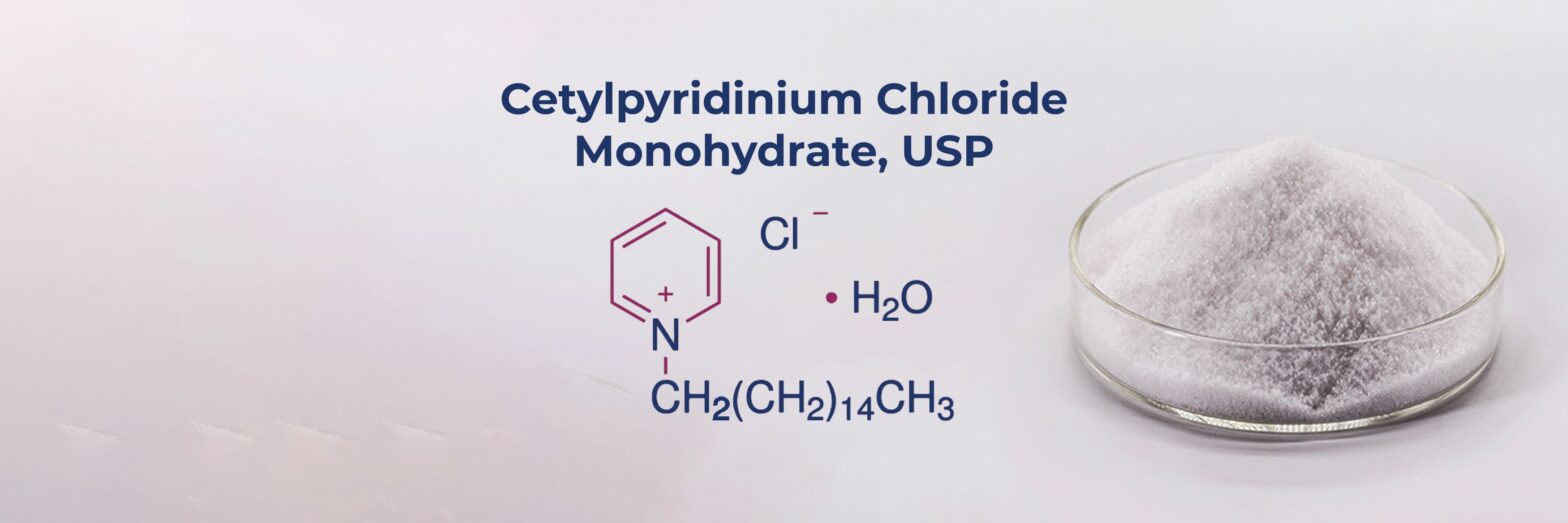INTRODUCTION
Cetylpyridinium chloride is the chloride salt form of cetylpyridinium, a quaternary ammonium with broad-spectrum antimicrobial activity. Upon topical administration, cetylpyridinium chloride is positively charged and reacts with the negatively charged microbial cell surfaces, thereby destroying the integrity of the cell membrane.
MANUFACTURE
The process involves reacting cetyl chloride with pyridine under nitrogen atmosphere in an autoclave pressure followed by agitation.
| Synonym | Hexadecylpyridinium chloride monohydrate |
| CAS no. | 6004-24-6 |
| EINECS No | 204-593-9 |
| Molecular formula | C21H38ClN · H2O |
| Molecular weight | 358.00 g/mol |
| Structure |  |
APPLICATIONS
| Used as an active ingredient in mouthwashes, toothpastes, lozenges, throat sprays, breath sprays, and nasal sprays. In these products, it generally mediates an antiseptic activity and protective action against dental plaque and reducing gingivitis. |
| Used on raw and fully cooked foods including, poultry, red meat, fish and shellfish, eggs, fruits, vegetables, cereal grains, nutmeats, and dairy products as an antimicrobial agent at levels not to exceed 1.0%. |
| It has also been used as an ingredient in certain pesticides. |
SPECIFICATIONS…USP
| Test | Unit | Specification |
|---|---|---|
| Description | – | White to almost-white powder, having a slight, characteristic odour. |
| Solubility | – | Very soluble in water, alcohol and chloroform; slightly soluble in benzene and ether. |
| Identification | To comply with USP tests (A,B & C) | |
| A. IR test | – | Positive |
| B. HPLC test | – | Positive |
| C. Chloride test | – | Positive |
| Acidity | – | Not more than 2.5 ml of 0.02N NaOH solution is required for neutralization. |
| Residue on ignition | % | NMT 0.20 |
| Organic impurities | ||
| 1. Myristylpyridinium | % | NMT 0.45 |
| 2. Stearylpyridinium | % | NMT 0.15 |
| 3. Any unspecified Impurity | % | NMT 0.1 |
| 4.Total impurities | % | NMT 1.0 |
| Water determination | % | 4.5 to 5.5 |
| Assay (on anhydrous basis) | % | Cetyl pyridinium chloride contains NLT 98.0 and NMT 102.0 of C21H38ClN. |
PACKING
25 kg Fiber drum.
STORAGE
Keep containers tightly closed in a dry, cool and well-ventilated place. Store at room temperature.
CERTIFICATION
WHO-GMP and WC
No matter the quantity you need, our exceptional quality and service will make ExSyn your supplier of choice! If you need any additional information or SDS, please contact us.
Iodine is anon-metallic, dark-grey/purple-black, lustrous, solid element. It is the heaviest and the rarest of stable halogens that can be found on the crust of earth.About fifty percent of all iodine produced and manufactured worldwide is used to form Organoiodine compounds. Iodine is an important element for many health-sustaining processes and essential for human thyroid health.
The product, acronymed Oct-NBE, is an organic compound with a cyclic ring system and a 8-membered hydrophobic chain. The structure renders the chemical special properties leading to its applications in diverse fields.
Nicotine is a hygroscopic, colorless to slight yellow, oily liquid, that is readily soluble in alcohol, ether or light petroleum. It is widely used recreationally as a stimulant and anxiolytic.
The product, acronymed ETD, is an organic compound with a fused bicyclic ring system and an ethylidene group. The structure renders the chemical special properties leading to its applications in diverse fields.
Sodium perchlorate monohydrate is the inorganic compound with the chemical formula NaClO4•H2O. It is the common existence form of sodium perchlorate, which can gradually absorb water in the air to form the monohydrate. Sodium perchlorate monohydrate is white rhombic crystal which is highly soluble in water and in alcohol. Its capacity to undergo redox reactions, liberating oxygen atoms, has been harnessed in the preparation of specialty chemicals, including pharmaceutical intermediates and fine chemicals.
Triphenylphosphine is a common organophosphorus compound that is frequently abbreviated as PPh3 or Ph3P. It is widely used in organic and organometallic compound synthesis because it is an effective reducing agent as well as a neutral ligand. At room temperature, PPh3 crystals are relatively air-stable and colourless.
Potassium chlorate holds significant importance across various industries due to its diverse applications. This white crystalline compound has been utilized for centuries as an essential ingredient in the production of matches, fireworks, and explosives, owing to its ability to release oxygen upon decomposition.
Podophyllotoxin is a non-alkaloid toxin lignan extracted from the roots and rhizomes of Podophyllum species. It is an organic heterotetracyclic compound that has a Furonaphthodioxole skeleton bearing a 3,4,5-trimethoxyphenyl substituent.
Octadecylphosphonic acid (ODPA), a versatile chemical compound, serves as a surfactant and dispersant in applications spanning coatings, lubricants, and corrosion inhibition. With its hydrophobic octadecyl chain linked to a phosphonic acid group, it excels in surface modification, boosting adhesion in metal surfaces.
